MSU Animal Science FFAR Fellows poised to advance future of dairy research, sustainability
Paiton McDonald and Haylee Reisinger, Animal Science graduate students, have been selected as Foundation for Food & Agriculture Research (FFAR) Fellows, which offers opportunities to further advance their impactful dairy research

Paiton McDonald and Haylee Reisinger, graduate students in the MSU Department of Animal Science, have been selected as members of the 2024-2027 cohort for the prestigious Foundation for Food & Agriculture Research (FFAR) Fellows Program.
The FFAR Fellows Program supports up to 30 scholars over three years who conduct vital research on U.S. agricultural and food systems in collaboration with industry and academic experts. Fellows attend trainings and network with peers from across the agricultural sector.
The program's mission is to shape the future of agriculture and food science by providing professional development opportunities that equip scholars with the skills needed for a successful transition into the workforce. The program offers experiences that prepare the agriculture workforce to tackle the industry's ever-evolving challenges.
As part of the FFAR fellowship, both students will partner with industry sponsors for unique opportunities to receive valuable career guidance and hands-on professional experience.
Though McDonald and Reisinger were recently selected as fellows, they are already actively contributing to tackling industry challenges through their dairy research at MSU.
The two graduate students work under the guidance of Barry Bradford, Ph.D., and Laman Mamedova, Ph.D., as part of the Dairy Metabolism Group. The group conducts urgent research that measures nutritional, environmental and physiological variables to understand better the conditions that promote optimal dairy cattle health, productivity and industry success.
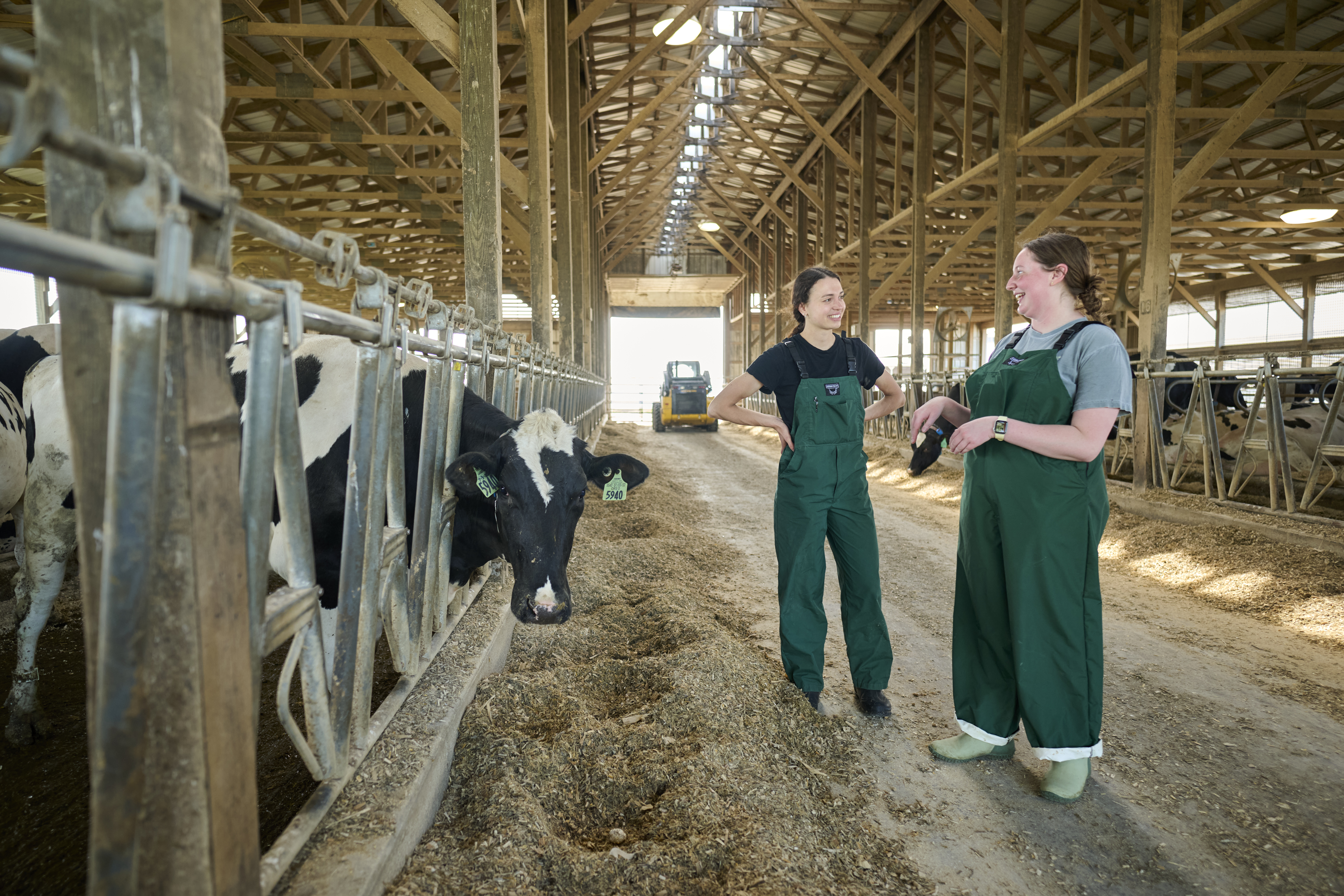
With global food security threatened by a growing world population, climate change and food waste, there is great urgency to maximize sustainability. Continuous research provides industry professionals the information and resources needed to make informed decisions that prioritize environmental stewardship and maintaining economic viability to foster a resilient, sustainable and more profitable dairy industry.
MSU is dedicated to cultivating the next generation of innovators poised to shape the future of dairy farming. By immersing students in research that addresses real-world challenges, MSU ensures graduates have the skills and knowledge needed to impact the industry.
"Our goal for graduate students is to help them develop a broad range of professional skills. Our students are exposed to many ways of conducting research and the numerous ways to contribute,” said Bradford, professor and C. E. Meadows Endowed Chair in Dairy Management and Nutrition. “They're developing an understanding of a wide range of approaches that will help them be impactful as they move forward and make a difference in the industry. One of the biggest things we can do in our area is to make the animals, through genetics or nutrition or other ways, more resilient to challenges, which could potentially lessen the total disease burden, improve animal welfare and decrease the environmental impact of the dairy industry.”
Enhancing calf immunity through sustainable nutritional modifications
McDonald completed her undergraduate degree at Iowa State University in agricultural biochemistry and international agriculture and worked in a lab focusing on calf immunology in response to infectious diseases. Pursuing her love of nutritional immunology brought her to MSU and the Dairy Metabolism Group, where she found the ideal conditions to take her work beyond the lab through mindful partnerships with local farmers.
"One of the main things that attracted me to Michigan State is the ability to do on-farm work. The collaboration with commercial farms and producers in Michigan and the ability to utilize the MSU Dairy Farm makes this a premier spot for dairy work, especially in the nutrition and health areas,” McDonald said. “We can figure out why something is happening in the lab and also take it to the producers to see direct impacts that we may be unable to see elsewhere."
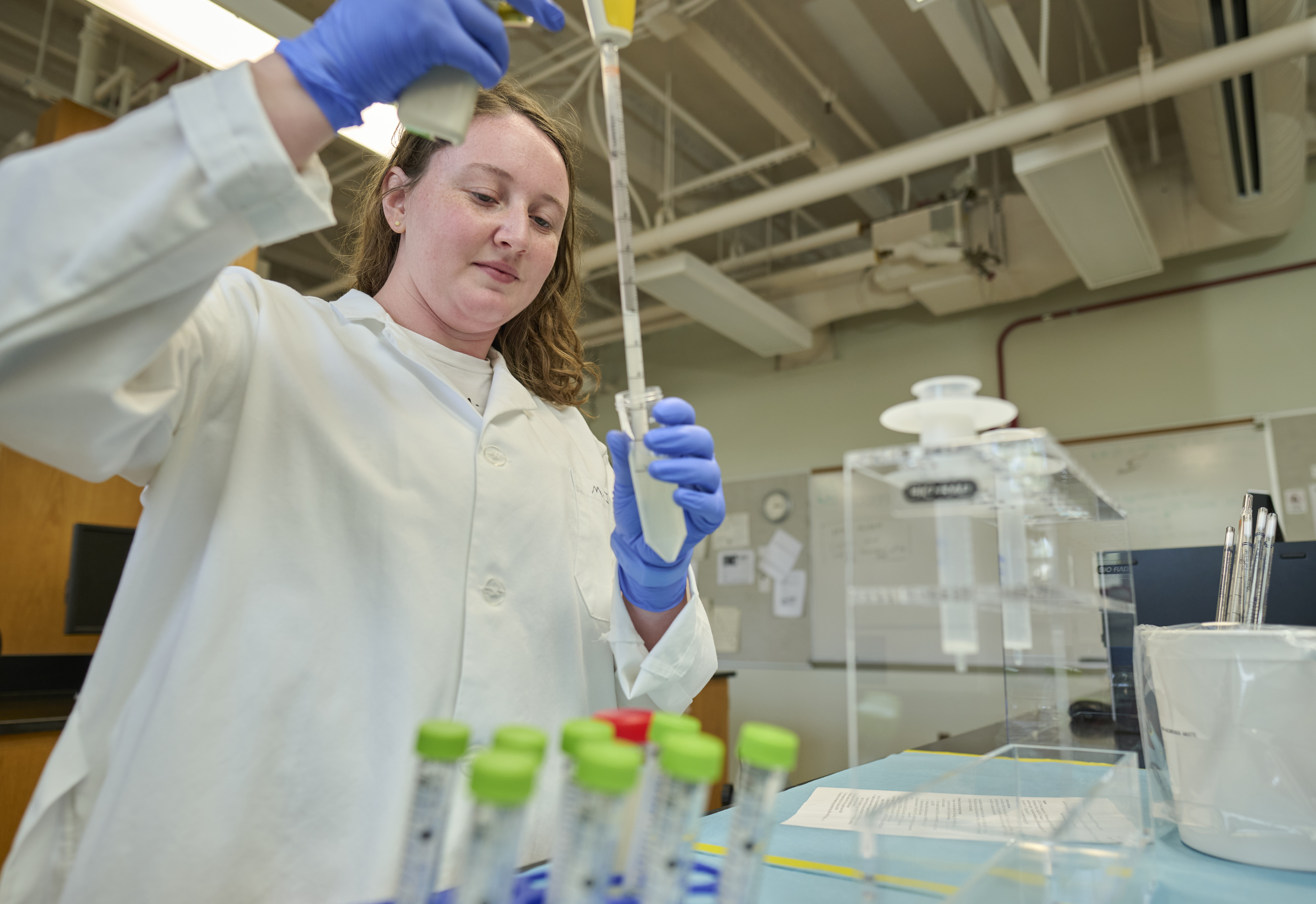
McDonald’s research focuses on sustainable nutritional modifications to calf programs to make calves healthier and more productive. Her goals are to help set neonates up for success through nutritional interventions, whether from the angle of neonatal immune development and nutrition programs or enhancing maternal health for downstream impacts. Part of her research involves studying the biochemistry of colostrum proteins, specifically immunoglobulin A (IgA), one of the isotypes of antibodies within the body.
Unlike humans, calves do not receive a substantial amount of preterm antibody transfer through the placenta, resulting in newborns being immune-naive. The primary role of IgA in the immune system is to help maintain homeostasis while helping combat microbial exposure. By isolating IgA in bovine colostrum, McDonald is characterizing the pattern of glycosylation, which impacts how IgA functions with pathogens and immune cells in the body. This work hopes to aid in managing dry cows and assess colostrum quality and potential immune development in calves, with a long-term goal of helping calves be less susceptible to disease after birth.
She also explores transition milk, which, like colostrum, is rich in nutrients and immune proteins and has been implicated in improving the growth and health of preweaning calves. McDonald’s work assesses the impacts of feeding transition milk on overall growth, immune development and production downstream for calves.
Additionally, McDonald studies the effects of supplementing rumen-protected glutamine to increase antibody production and maintain a cow's health as she transitions into lactation. In the last few months of gestation, during a cow’s dry period, they transition from a high-energy to a lower-energy diet and receive several vaccines. This part of her work will target the heifers and dry cows' vaccination regime with each pregnancy, ultimately emphasizing mucosal immunology and encouraging calf mucosa microbial homeostasis. In other words, McDonald aims to support cow health during the shift to a lower-energy diet by supplementing glutamine to enhance the efficacy of vaccinations.
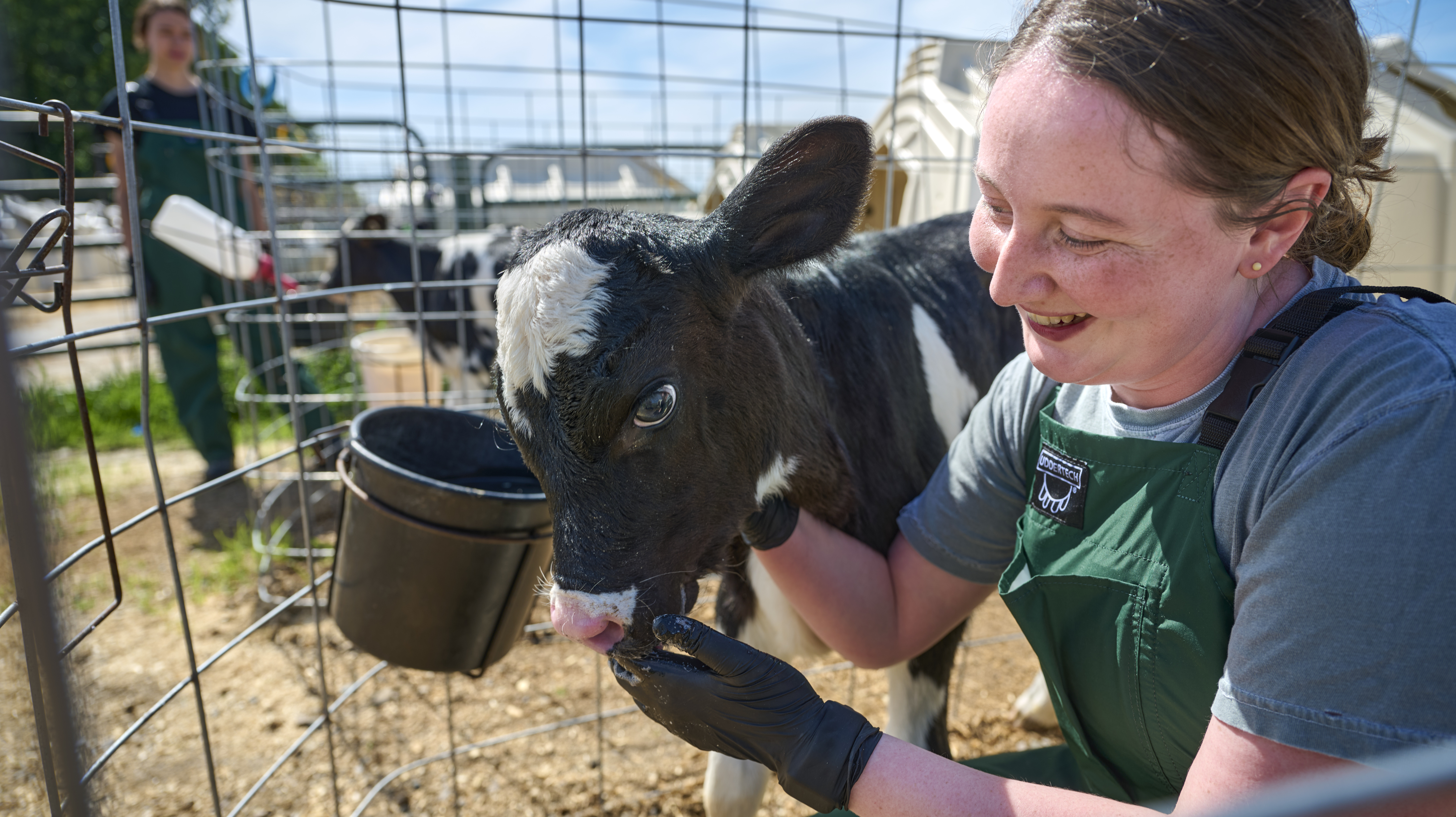
“Feeding the future requires resilient, empowered, sustainable food and animal systems. As calf morbidity and mortality rates have remained relatively stagnant over the past two decades, calves remain one of the most at-risk groups in dairy herds worldwide,” said McDonald. “This is evident by the prevalence of mucosal diseases affecting calves, commonly known as bovine respiratory disease or scours. Therefore, we must enhance calf immune development to advance animal systems and steward antimicrobial use.”
McDonald's industry sponsor for the FFAR fellowship is United Animal Health, an organization dedicated to advancing global animal science by collaborating with producers to provide proven, research-based nutrition and health solutions.
"United Animal Health (UAH) is all about creating innovative solutions for the ever-changing challenges," said McDonald. "With issues we're facing, like climate change and resource availability, everyone must learn how to keep moving forward. As a FFAR fellow, I can foster my continuous learning mindset and grow as a future leader through access to opportunities from each sector, including mentorship from the incredible ruminant research team at UAH.”
Leveraging bioactive compounds and human-inedible waste
Reisinger is from a small rural town in central Pennsylvania populated with small family farms. During her undergraduate studies at Penn State University, she majored in biology and knew she wanted to pursue a career related to animals and agriculture.
While at Penn State, she joined an entomology research lab, where she studied biocontrol methods to reduce filth fly populations on poultry layer farms. That experience solidified her desire to pursue a career in research.
"What caught my interest was, 'We have this problem; how can we solve it?' Our work in that area not only benefited the chickens, but also the farmer. It also was a public health concern because flies are a vector for disease. It was amazing how many areas were affected and how much that work could have an impact. Through that experience, I knew I wanted to continue with agricultural research." 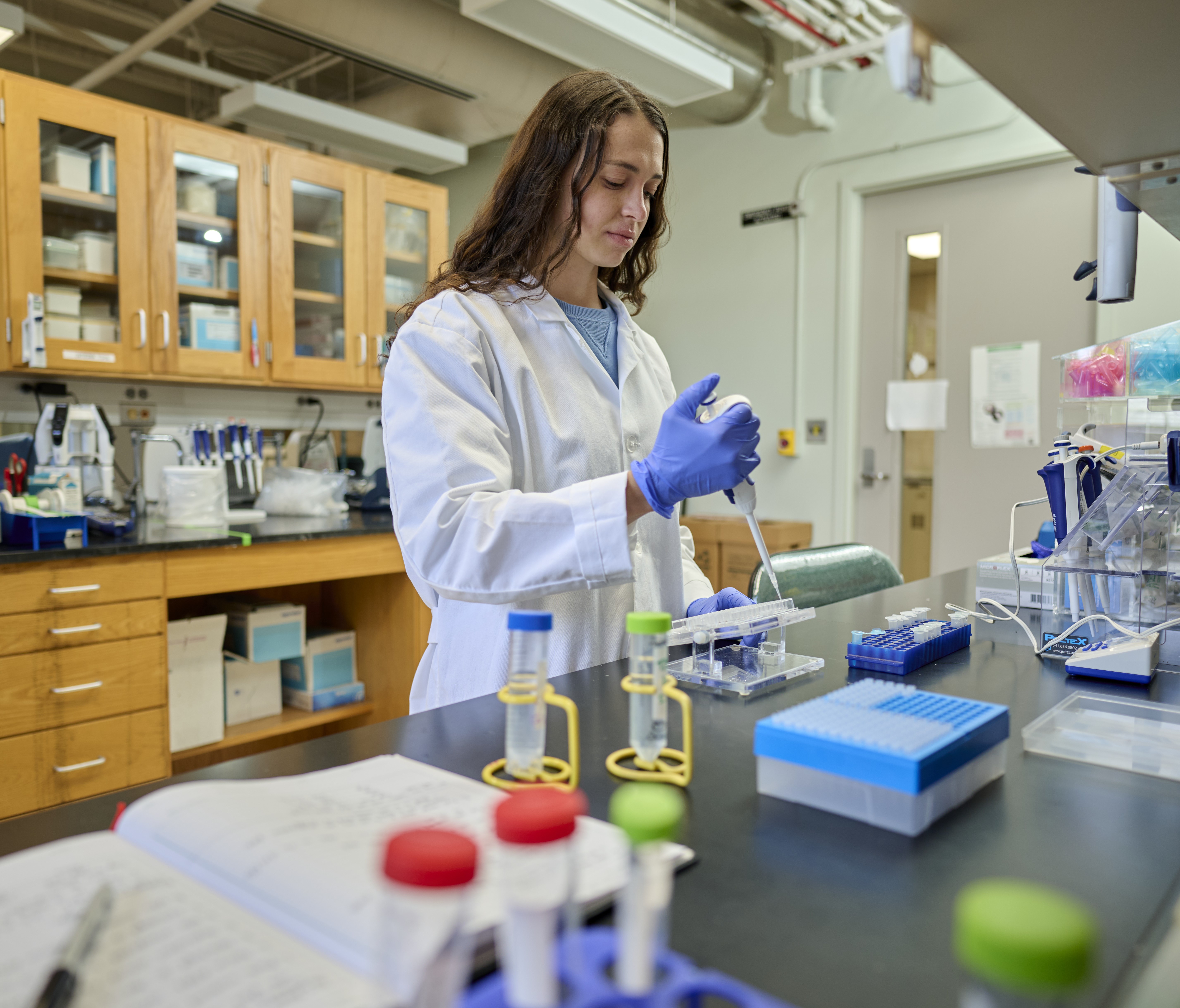
Reisinger's research with the Dairy Metabolism Group focuses on improving dairy cattle health by supplementing bioactive compounds in their diets to enhance immune function and overall well-being by helping prevent or clear infections quicker. Bioactive compounds naturally occur in many plant species and are found in various animal and bacterial products.
Reisinger has investigated the benefits of omega-3 fatty acids, particularly docosahexaenoic acid (DHA), known for their anti-inflammatory effects. In her initial project, she studied the impact of DHA on lactating cows to understand its impact on immune cell function and developed an in vitro assay to evaluate neutrophil performance. This research helped identify the most effective DHA dose for boosting immune responses and potentially helping decrease inflammation. Reisinger's recent work involved feeding omega-3 supplements to transition cows, which previous studies have linked to improved milk production and reproductive outcomes.
"A practical way of supporting the cow is by supporting immune function and providing the necessary nutrition it requires," said Reisinger. "Bioactive compounds affect various pathways within the body, and many of these compounds positively affect immune function and health. Utilizing these compounds is potentially a more natural approach to keep our livestock healthy and reduce the reliance on antibiotics."
MSU is already actively applying the data from Reisinger's research in this area to ongoing initiatives at the university.
"Haylee's project related to omega-3 fatty acids had positive results, and we are actively using that data in our work related to a USDA grant," said Mamedova, a senior research specialist with the Dairy Metabolism Group. "The impact of her work is already tremendous and will only continue to grow from here."
Reisinger's research supports sustainability by utilizing bioactive compounds in human-inedible waste. She has explored the use of an extract developed from discarded tart cherry pits to combat inflammation in vitro. So far, her work has been applied to cell culture models, with the hope to advance use on live animals soon. Michigan, the nation's leading producer of tart cherries, often discards these pits in landfills, a source of methane emissions. Reisinger's reallocation of tart cherry pits by extracting and utilizing these compounds could reduce the waste in landfills, especially in Michigan, while contributing to global food security.
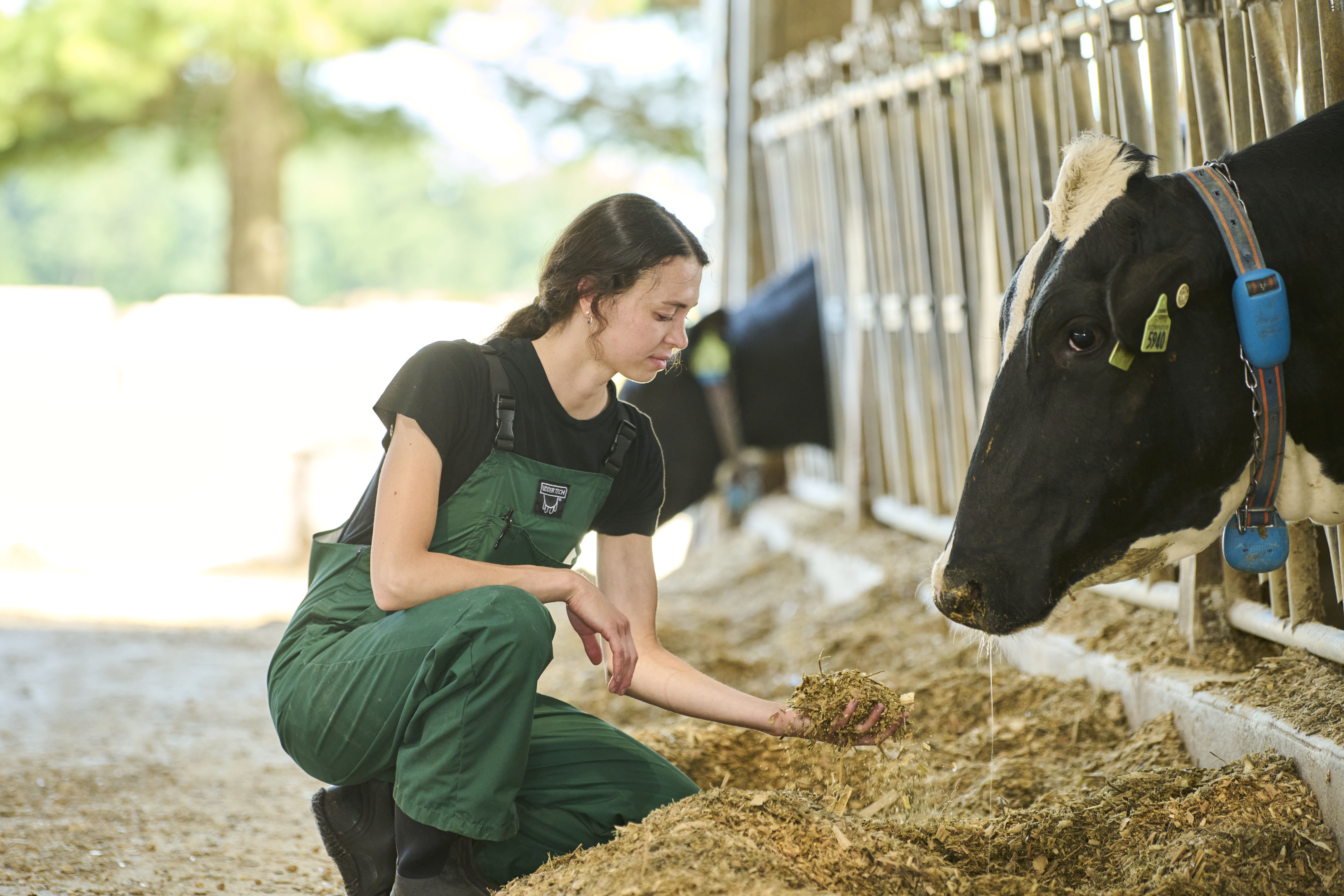
"We have a growing population and need to help ensure food security through these dairy products. My outlook is to identify other waste products like human-inedible foods and see what bioactive compounds are present to repurpose them and decrease the waste discarded into landfills,” said Reisinger. “Keeping animals healthy using a waste product could help reduce reliance on antibiotics while contributing to a more sustainable dairy industry and a more secure food supply."
Using waste products to support dairy operations illustrates a larger vision for evolving agricultural practices. These diverse benefits underscore the critical role of sustainability in farming and highlight the potential of ongoing research and industry partnerships.
"This work repurposing waste could help make the dairy farm more profitable," said Bradford. "It could help decrease the industry's environmental impact. It helps make milk cheaper at some level. It improves animal welfare. Outcomes like that are potential but inspiring goals for the industry."
Reisinger hopes to create feeding strategies incorporating these and other bioactive-rich byproducts into dairy diets. By utilizing food waste-derived bioactive compounds, she strives to promote healthier dairy cattle, reduce the need for antibiotics and continue contributing to a more sustainable dairy industry.
Reisinger's fellowship industry sponsor is Natural Biologics, a livestock feed supplement company that provides unique natural solutions that enhance the health and productivity of animals worldwide.
“I was initially interested in applying for the fellowship because of FFAR’s commitment to tackling key challenge areas within environmental sustainability, improving animal health and advancing nutritional security. The opportunity to learn from an industry sponsor makes it more exciting,” said Reisinger. "As graduate students, we get so immersed in science and the conditions we work in that we forget research farms are different from commercial or family farms. This opportunity will allow me practical industry experience while preparing for a future career."
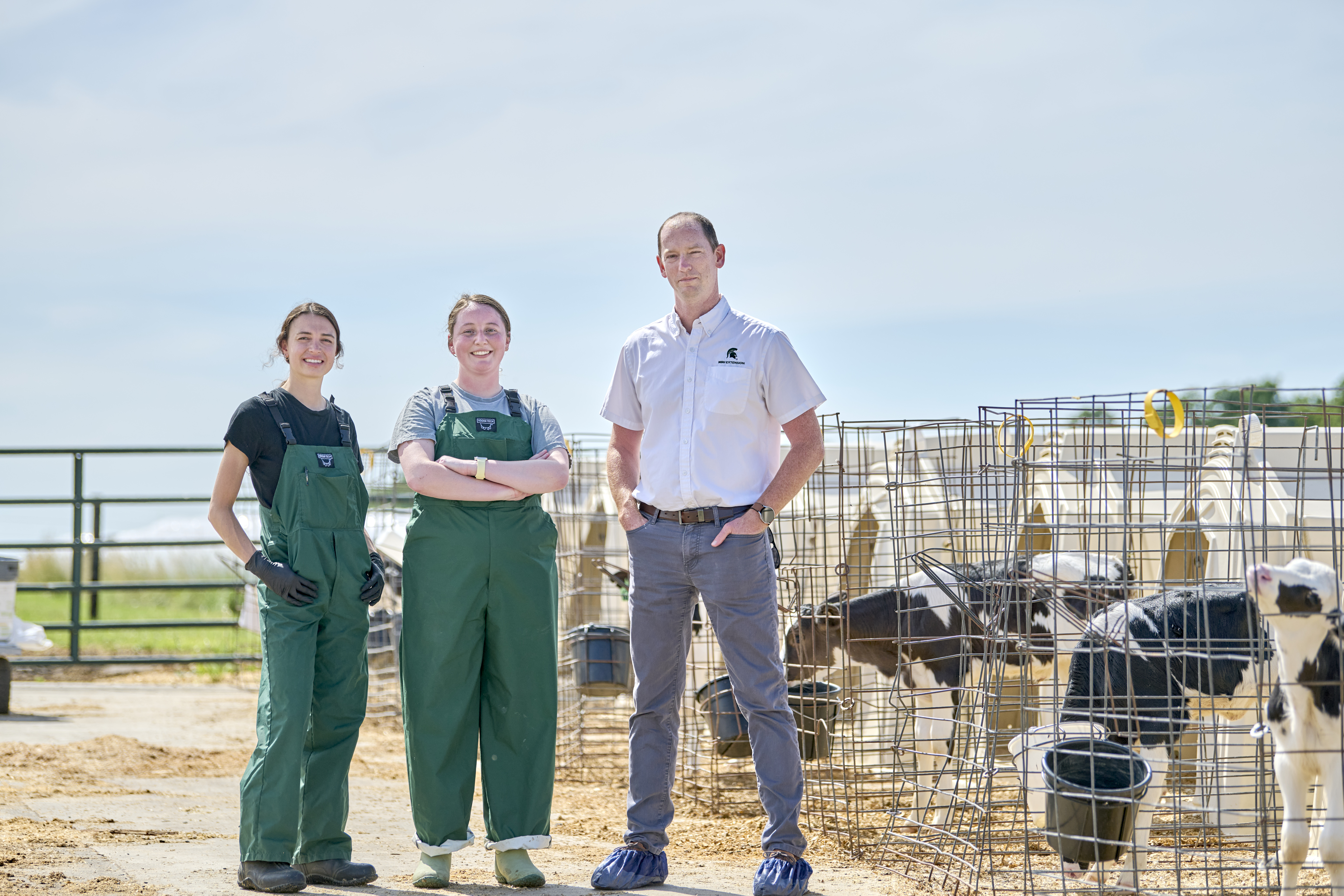
Preparing future agricultural leaders to drive innovation and research
The program’s blend of experiential learning, academic research and professional development is the cornerstone of the broader FFAR program, which Bradford describes as an invaluable framework for nurturing the next generation of agricultural researchers.
"The program is helping some of the brightest young minds in agricultural research to complement their academic pursuits. They are learning scientific concepts at the university while developing soft skills and broader professional development as part of the fellowship. They can also interact with other fellows from around the country and their industry mentors, and they are building a great professional network,” Bradford said.
McDonald and Reisinger's time as FFAR fellows will benefit them individually while bringing valuable insights back to the MSU community.
"This experience will benefit the rest of our research group because we can hear what the students learned, what inspired them and what suggestions they might develop from their experience on how we can improve things here," said Mamedova. "Even if they can return 10 percent of what they learn and experience, Michigan State University will benefit tremendously."



 Print
Print Email
Email



